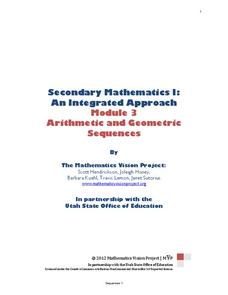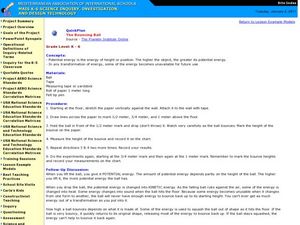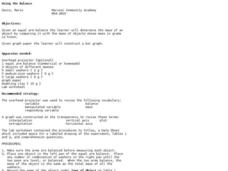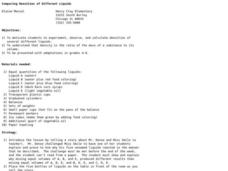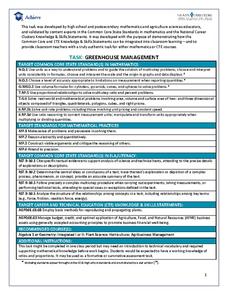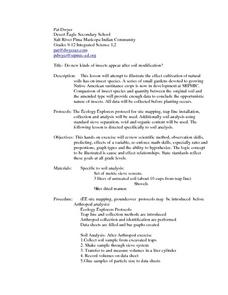Curated OER
Integrating Science and Literacy Through Novel Studies
You can use "The Toothpaste Millionaire" and other outstanding fiction to integrate science and literacy.
Curated OER
Integrating Science and Literature: Life as We Knew It
Supplement your science units with science fiction novels!
Baylor College
Breathing Machine
Take a deep breath and have your class construct working models of a lung! Using 500ml plastic bottles as the chest cavity, and balloons for the lung and the diaphragm, learners work in groups to make a model. The models help them to...
Cornell University
Scaling Down: Effects of Size on Behavior
Two activities explore the concept of size, especially small sizes down to the nano. Scholars practice determining volume, mass, and density and calculate exponential increases and decreases. They then predict and test the effect of size...
Mathematics Vision Project
Module 3: Arithmetic and Geometric Sequences
Natural human interest in patterns and algebraic study of function notation are linked in this introductory unit on the properties of sequences. Once presented with a pattern or situation, the class works through how to justify...
US Department of Energy
Go Far Cars Ramp: A Basic Ramp with Four Height Settings
Precise measurements make the job easier! One of the challenges when using an inclined plane for testing comes from pupils not using exact measurements. They often rely on books that slide or different ramp lengths when experimenting. By...
Curated OER
The Bouncing Ball
Students use the scientific method to conduct an experiment to test how a ball bounces. In this inquiry-based physical science and scientific method lesson, students drop a ball from specified heights and record the rebound, then record...
Curated OER
How to Build an Electric Motor
Sixth graders build a working motor. In this lesson on motors, 6th graders use an inquiry method of learning to discover how to create a working electric motor with the supplies given to them. The teacher will guide them as needed....
Curated OER
Integrating Art Into Other Content Areas
Here are some ideas to help add an art lesson to every math, science, social studies, or language arts unit.
Curated OER
AP Calculus Exam Prep
Pupils practice sample questions from the AP Calculus Exam. They solve calculus problems involving bounded regions, integration, derivatives, and limits. They then answer free response and multiple choice questions on the above mentioned...
Curated OER
Gateway Arc Length
Learners differentiate and calculate the length of an arc. They define an arc and relate it to the area of a circle and integrate the function to solve the equations. Students use their TI calculators to graph the equation.
Curated OER
The Region Between Two Curves
Learners find the area of a region between two curves. They integrate functions such as sin(x) and cos(x) on a given interval and find the area bounded by the two functions. Pupils use their TI-89 to aid them in finding the bounded...
Curated OER
Using the Balance
Students determine the mass of various objects. In this integrated math and science lesson, students use an arm balance to compare a known object to a combination of washers with a fixed weight. Students record data, construct a bar...
Curated OER
Comparing Densities of Different Liquids
Students experiment with a variety of liquids to calculate density. For this integrated science and math lesson, students listen to a story in which the characters must prove and explain why 5 "mystery" liquids react in a certain manner....
Baylor College
Using Food Labels
Help your class make sense of nutrition labels with the ninth lesson plan of this series. After explaining the different information provided on packaged food labels, perform an activity that demonstrates the amount of sugar in a single...
Baylor College
How Much Water Do Humans Need?
Physical or life science learners measure the amounts of water eliminated by intestines and the urinary system, and the amounts lost via respiration and perspiration. In doing so, they discover that the body's water must be replenished...
Baylor College
Plant Parts You Eat
Plants provide a variety of delicious foods essential for human survival. In the fourth lesson of this series on food science, young scientists investigate common fruits, vegetables, and grains in order to determine which plant part is...
Baylor College
Bio Build-up
Trace pollutants through the environment in the seventh lesson of this series on the science of food. Looking at a picture of the plants and animals in an aquatic ecosystem, learners use dot stickers to represent harmful chemicals as...
Baylor College
What's That Food?
Get things cooking with the first lesson in this series on the science of food. Working in small groups, young scientists make and record observations about different mystery foods. These descriptions are then shared with the class and...
Achieve
Greenhouse Management
Who knew running a greenhouse required so much math? Amaze future mathematicians and farmers with the amount of unit conversions, ratio and proportional reasoning, and geometric applications involved by having them complete the...
Baylor College
They're Everywhere: Bacteria
Totally gross out your class with the eighth lesson in this series on food science. Explore the microscopic world of bacteria by taking swabs of different classroom objects and growing colonies in petri dishes. An engaging activity that...
Baylor College
Healthy Snacks
Assess your pupils' ability to identify healthy food choices in the final lesson of this series on food science. Given five different food labels, young nutritionists will rank them from most to least healthy, supporting their choices...
Curated OER
Vernier EasyData App
Used along with data collection devices, the EasyData Application for the TI-83 Plus/TI-84 calculator allows learners to use real data to learn math and science. Statistics, curve fits, and integrals are used to analyze the collected...
Curated OER
Do new kinds of insects appear after soil modification?
Students explore and experiment with the concept do new kinds of insects appear after soil modification. They assess and review scientific methods of observation, predicting, variables, math skills, ratio, proportions, graphs and the art...
Other popular searches
- Integrated Math and Science
- Integrating Math and Science
- Math Integrating Science
- Science Math Integration
- Math Integrated Into Science
- Integrate Science and Math
- Integrated Math & Science
- Math Integrated With Science






